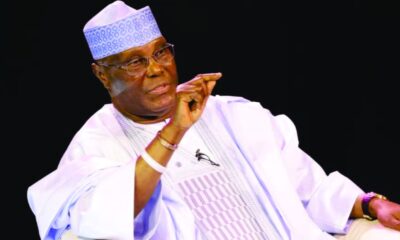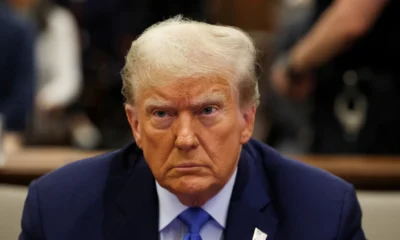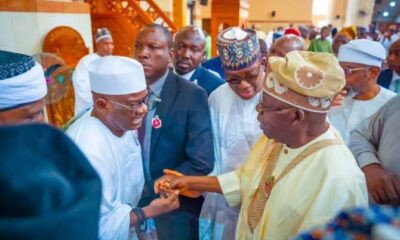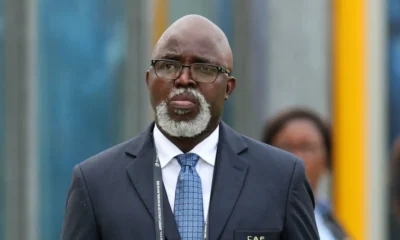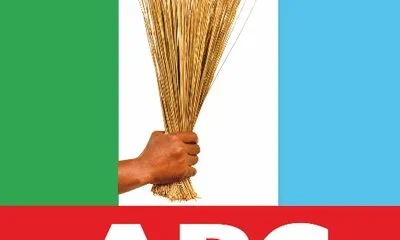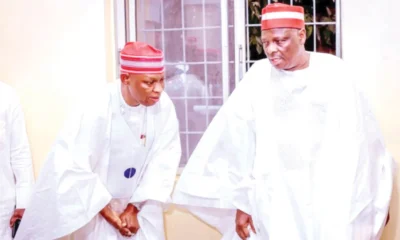Opinion
Next time, Umahi should go to NTA
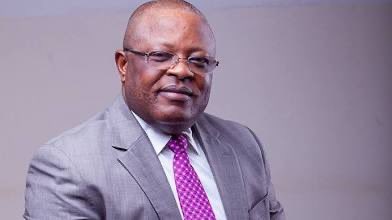
Minister of Works, David Umahi, got into an acrimonious exchange with Arise TV news anchor Rufai Oseni recently when he refused to answer a question the latter posed to him. Our culture preaches deference to elders and for that reason alone, some commentators could not believe the audacity of standing one’s ground when dealing with someone who has money and social status. Since those people have read the BBC style book closely enough to determine how a journalist’s conduct, can they also avail themselves of a guidebook that instructs politicians on their public comportment? If our ethicists are so passionate about the standards of professionalism, they should extend it both ways rather than hold the journalist to higher standards than the politician.
A sincere question for Umahi: if he is too self-important to face a panel of journalists and confront their hostile questions with facts readied at the tips of his fingers and his tongue, why appear on a television station? If he truly desires to be on television but would prefer the anchors to fete him rather than grill him, he had the choice to head for the state-owned station, the NTA, where he would be guaranteed a courtesy indistinguishable from the obsequiousness that public servants in Nigeria badly crave. I do not quite understand the people who took issue with Oseni over his taking Umahi to task. Umahi offered to be interviewed, not that they dragged him out of his house and forced him to appear on TV. They gave him a date and time, and he accepted. If he got dressed and sat in front of the TV without coercion, why exhibit recalcitrance because they asked you a question? What did he think he would be doing once they got on the air?
If you watch television frequently, you should already be familiar with Arise TV and its anchors’ individual styles. Some are muckrakers, others levelheaded; some are combative, some speak softly. You must also be aware of the station’s politics, ideological slant, market niche, branding, and the audience they cater to, to know what will happen when they put you on air.
Every media station defines itself by ideological biases, and if you are not forced to appear on their station, why go on their territory? In a place like the USA that has thousands of media stations, politicians are usually selective about where they appear. To avoid embarrassment, they do not accede to interviews with unfriendly media houses. You do not enter a hostile territory and attempt to bend people to your will. Democratic party members hardly appear on conservative Fox News, the same way their Republican counterparts will hesitate to be interviewed by liberal leaning CNN. Politicians who want to speak to a neutral audience seek out the media stations that cater to that demographic. Simple. I have observed that every time Oseni gets into a tough session with a politician, certain people whip out their Journalism 101 textbook and start quoting the “ethics” of the profession, conveniently forgetting that the nature of the news business has long evolved.
To anyone observant enough, news as an enterprise operates in a market where people have unlimited sources of information and distractions, and the old rules do not always apply. In the age of social media, what is called “news” ranges from sombre reports to blood sports; it is up to the viewers to make their choices from the selection. The old journalistic rule of thumb, “if it bleeds, it leads”, has given way to “if it will trend, better lead with it”. No one should be so naïve as not to have known this and prepared adequately. You either do the hard work of meeting your inquisitor with undisputable facts or you stay in your echo chamber. Umahi wanted to take advantage of everything Arise TV has to offer, which their state-funded news machinery evidently lacks—high-quality production, wide ratings, and an extended network reach—but did not want to do the hard work of preparation.
From their exchange, it turned out that the vexing question he was asked had come up previously. He appeared on the same station a second time and still did not bring any material to improve the discussion.
This time, he should have been ready with his facts and figures, but no, he thought that stating the statistics of his ongoing road project would be like “naming a baby that has not been born”. You listen to that and realise how much our leaders are steeped in primitive thinking. Yes, in a superstitious culture where people think that witches can eat your pregnancy, naming an unborn child is tempting fate. However, in a culture that has invented machines that can monitor the growth of a fetus every moment of the cycle and calculate many of the odds that might arise, they actually do name an unborn child.
This brings me to another issue I have written about in the past: when Nigerian politicians appear on television, it is almost always evident from the way they answer questions that they did not prepare. They take it for granted that they can BS their way through the session, and it shows in their conduct. I can bet any amount that Umahi did not get anyone to help him watch some past interviews, develop a set of questions that might possibly emerge (or even request the questions ahead), and rehearse his answers for him to give the best account of himself. If anything comes up after your preparation and you do not have your facts at hand, tell them you will check and get back to them on that—and do!
Like an average Nigerian big man, Umahi went on television ready to dazzle but ended up narrating endless monologues that had little to do with the issue at hand. Answering questions on television requires conciseness, a technique that comes with adequate preparation and rehearsal. He went on and on like he had been asked to bless the kolanut at a village meeting and capped the endless ramble with a lost temper. At the end of the day, he came across as shady and disingenuous. He insisted it was premature to reveal figures only to belatedly provide them days later. So, what was the drama all about when you could have done so or promised to do so later when you had cross-checked?
Finally, what vexes me most about the whole issue is that the Lagos-Calabar Coastal Highway is just one stretch. The way people have spilled sweat, saliva, and ink over it, one would be forgiven for imagining that what they are building is the peak of engineering feats. Recall that because of this single stretch of road, Reno Omokri too once donned a costume, carried a measuring tape, and invited a media crew to go with him as he made a show of checking the length of the tarred portion. If we can expend so much passion over a single stretch of road, what will now happen if Nigeria decides to construct a modern interstate highway system, like serious countries have done? Meanwhile, while they celebrate it as a singular and defining achievement, many of the roads at the federal, state, and local government levels remain decrepit and impassable. When the construction finally finishes, I can imagine how our politicians will celebrate it as if we have built something akin to China’s national expressway network.
•Written By Abimbola Adelakun
-

 Politics11 hours ago
Politics11 hours agoAtiku Playing With Democratic Sabotage – Presidency
-

 World News11 hours ago
World News11 hours agoUS Deploys 10 Warships To Middle East As Trump Escalates Pressure On Iran
-

 Politics5 hours ago
Politics5 hours agoTinubu has sidelined people who helped him succeed as Lagos governor, says Ndume
-

 Sports11 hours ago
Sports11 hours agoNigeria Would Have Qualified For World Cup If I Were In Charge-Pinnick
-

 Politics10 hours ago
Politics10 hours agoWe Won’t Recognise Elections Conducted By Amupitan – Shariah Council
-

 Politics11 hours ago
Politics11 hours ago2027: APC moves to manage defection gains, internal crises
-

 News11 hours ago
News11 hours agoDiezani lavished over N4bn in London luxury store – UK prosecutor
-

 Politics10 hours ago
Politics10 hours agoGovernor Yusuf Will Be Defeated In APC – Kwankwaso



